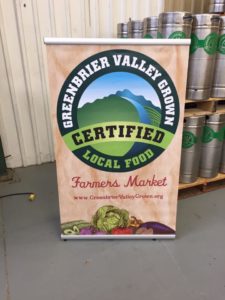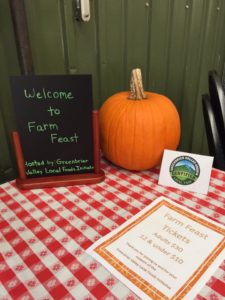By Heather Hanna
The Greenbrier Valley is arguably one of the most beautiful areas in West Virginia. It is a breathtaking combination of mountains and farmland, and it is also one of the top cattle producing areas in the country. Large and small farms all over Greenbrier, Monroe and Pocahontas counties produce cattle, sheep, chickens, pigs, fruits and an endless variety of vegetables. Saturday morning trips to local farmers markets are a regular part of life in many Greenbrier Valley towns from spring until late fall.
 In 2011, the Greenbrier Valley Economic Development Corporation (GVEDC) launched the Greenbrier Valley Local Foods Initiative (GVLFI). The mission of GVLFI is to support local, food-focused projects and organizations to increase economic return to the food producers of Greenbrier, Monroe and Pocahontas counties. In essence, they create new sales avenues for farmers to increase their businesses. One aspect of this process is branding local producers, retailers and restaurants as Greenbrier Valley Grown Certified (GVG) entities. The GVG certification is a promise to consumers that the food they are purchasing has been locally grown.
In 2011, the Greenbrier Valley Economic Development Corporation (GVEDC) launched the Greenbrier Valley Local Foods Initiative (GVLFI). The mission of GVLFI is to support local, food-focused projects and organizations to increase economic return to the food producers of Greenbrier, Monroe and Pocahontas counties. In essence, they create new sales avenues for farmers to increase their businesses. One aspect of this process is branding local producers, retailers and restaurants as Greenbrier Valley Grown Certified (GVG) entities. The GVG certification is a promise to consumers that the food they are purchasing has been locally grown.
For the past four years, GVLFI has held a fundraising and marketing event, aptly named Farm Feast. This year, it was held at the Greenbrier Valley Brewing Company. The dinner itself consists of locally produced foods, including beef brisket, pork roast and chicken, all provided by Greenbrier Valley Grown-certified farmers and smoked by a local restaurant for the event.
In addition, organic mixed green salad, roasted root vegetables and butternut squash soup is created by area restaurants from locally grown produce. The event is meant to feature local foods, promote the GVG brand and help educate people on the value of not only eating healthier but supporting the local economy as well.
“Agriculture has always been a critical part of the local economy, and GVEDC is proud to support the region’s farmers through our company’s local foods initiative,” says Interim Director Tom Cross. “The Farm Feast is a great time for people who attend. The food is amazing, and it is a great opportunity for producers to learn how our programs can help them increase their farm sales.”
The movement to eat locally sourced foods is increasing every year. As the practices of mass production farms both inside and outside of the United States come more and more into question, people have become increasingly concerned about what is being done to their food. The emergence of genetically modified organisms, or GMOs, in food production has only served to further heighten peoples’ fears that the food they are purchasing could be doing more harm to their bodies than good. The farm-to-table concept also continues to grow in popularity and has become a cornerstone of the marketing campaign for the Greenbrier Valley Convention and Visitors Bureau.
Until 2016, the Farm Feast has been an increasingly popular event. Due to historic flooding in June, though, this year’s event saw its first decrease in attendance. In light of the flood damage, the media encouraged people to stay away from the impacted areas and let people recover in peace, unless they were coming to roll their sleeves up and help, which, thankfully, many did. For a region of the state that relies heavily on tourism, the economic impact to the Greenbrier Valley has been substantial to say the least, with the effects being felt by businesses and nonprofits alike. Every fundraising event hosted in the Greenbrier Valley area has seen a decline this fall.
Despite the decreased turnout at Farm Feast 2016, those in charge of the GVLFI are not discouraged. They know they serve a noble cause: the livelihood of the hardworking farmers of the Greenbrier Valley and the increased availability of locally sourced food to its fine citizens. As the Greenbrier Valley continues to recover from the devastating floods of this past summer, GVLFI will continue to work to preserve the proud food heritage that has been a key part of the local economy for generations.
For more information about the work and mission of the Greenbrier Valley local food initiative or the Greenbrier Valley Grown certification program, email greenbriervalleygrown@gmail.com or hhanna@gvedc.com.
 About the Author
About the Author
Heather Hanna is a regular contributor to Hashtag WV, a monthly entertainment tabloid locally published in the Lewisburg, WV, area. Born and raised in Brooke County, she relocated to Greenbrier County in November 2015 with her husband and two children. A former small business owner, Hanna is now employed by the Greenbrier Valley Economic Development Corporation in Maxwelton, WV.








